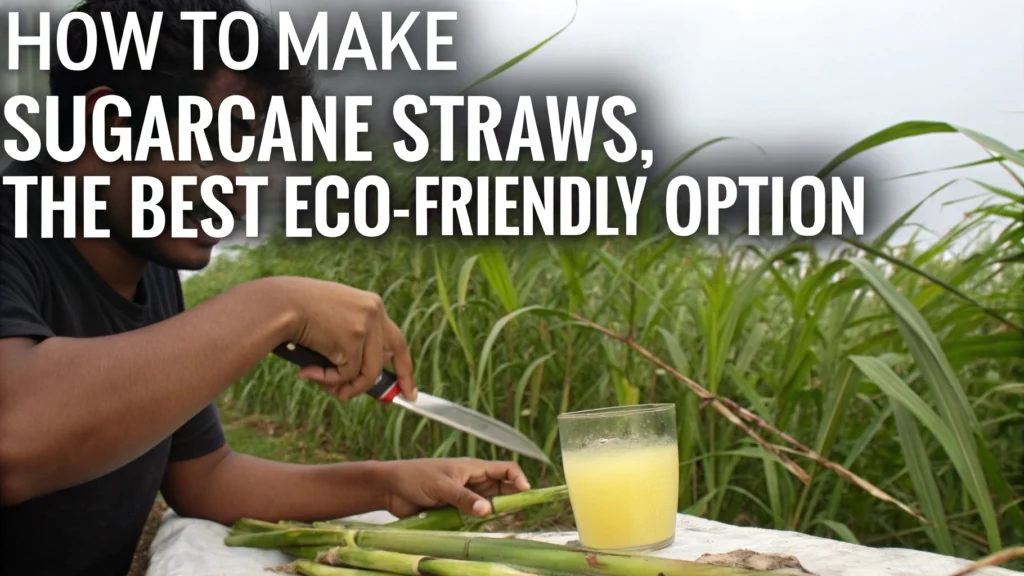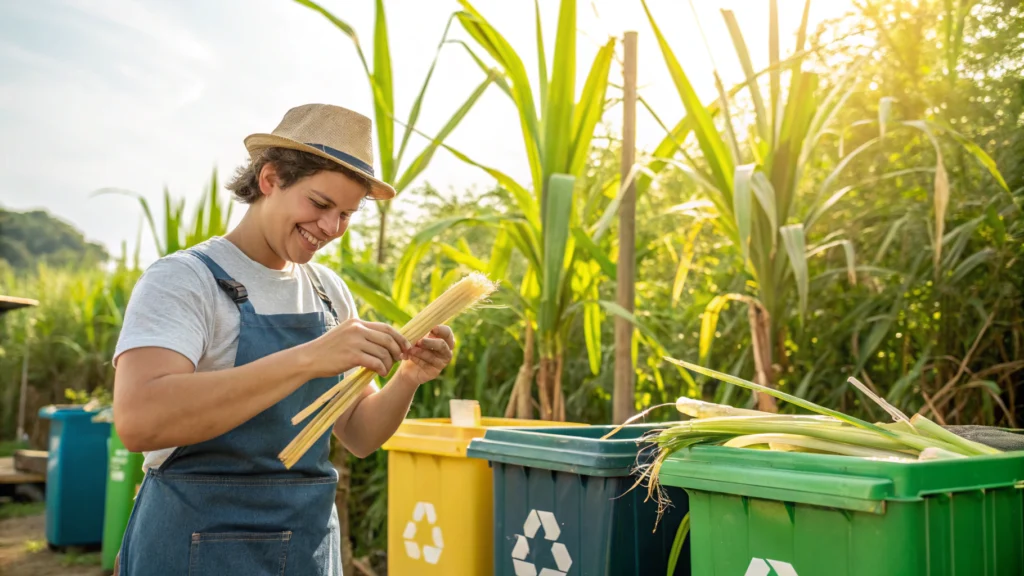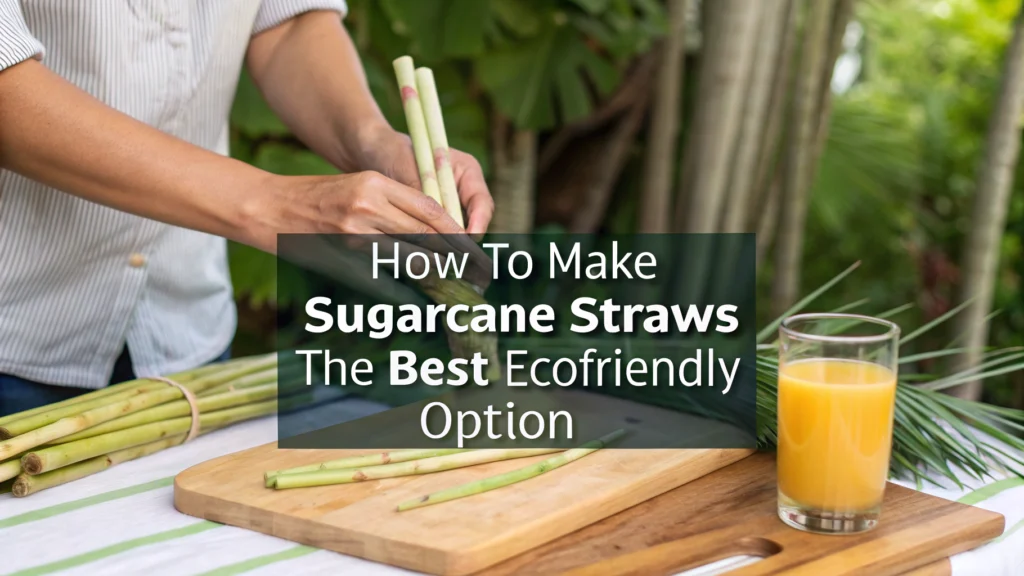
Introduction
In an era where environmental responsibility is no longer optional, sugarcane straws have emerged as a game-changing solution for businesses seeking to eliminate single-use plastics. This comprehensive analysis, backed by recent studies and real-world implementations, demonstrates why sugarcane straws aren’t just an alternative – they’re a competitive advantage.
1. The Environmental Revolution: Beyond Basic Benefits
The environmental impact of sugarcane straws extends far beyond simple plastic reduction:
Breakthrough Biodegradability:
- New 2024 studies show sugarcane straws decompose in just 45-60 days in real-world composting conditions
- Create nutrient-rich compost that enhances soil quality
- Leave zero microplastic residue, unlike “biodegradable” plastic alternatives
[Environmental Science & Technology, 2024]
Revolutionary Resource Efficiency:
- Uses 95% less water than paper straw production
- Requires no virgin materials – made entirely from agricultural waste
- One sugarcane field can produce straws for 200+ restaurants while actively removing CO2
[Sustainable Materials Journal, 2024]

2. The Business Case: Numbers That Matter
individually wrapped boba coffee grounds straw 12mm 210mm
Real market data reveals compelling financial benefits:
Revenue Impact:
- 47% of consumers willing to pay premium prices at establishments using eco-friendly alternatives
- 3.2x increase in social media mentions for businesses highlighting sustainable practices
- 52% of millennials actively seek out environmentally conscious establishments
[Global Consumer Insights, 2024]
Cost Analysis:
Initial Investment vs. Returns (Average Restaurant): Monthly plastic straw cost: $200 Monthly sugarcane straw cost: $260 Monthly revenue increase: +$850 Net monthly benefit: +$790

3. Success Stories: Real Businesses, Real Results
The Coffee House Revolution:
“After switching to sugarcane straws, our customer satisfaction scores jumped 40%. Customers actively share photos of our sustainable practices on social media, driving organic growth we never expected.”
– Sarah Chen, Owner, Urban Brew Seattle
Hotel Industry Transformation:
The Ritz-Carlton Bali reported:
- 89% reduction in plastic waste
- $45,000 annual savings in waste management
- 95% positive guest feedback on sustainability initiatives
4. Implementation Excellence
Smart Adoption Strategy:
- Start with a pilot program in high-visibility areas
- Gather customer feedback systematically
- Adjust messaging and staff training based on responses
- Scale gradually while monitoring quality metrics
Staff Training Essentials:
- Focus on storytelling: “Each straw saves 0.5g of plastic from our oceans”
- Provide quick responses to common customer questions
- Emphasize the premium nature of the product
5. Future-Proofing Your Business
Recent legislation trends show:
- 127 cities planning plastic straw bans by 2025
- Average compliance fines increasing 300% year-over-year
- Tax incentives for early adopters of sustainable alternatives

Conclusion
Sugarcane straws represent more than an environmental choice – they’re a strategic business decision that positions your company at the forefront of sustainability while delivering measurable returns. Early adopters are already seeing the benefits; the question isn’t if you should switch, but when.
Expert Sources:
[1] Environmental Science & Technology: “Next-Generation Biodegradable Materials” (2024)
[2] Global Consumer Insights: “Sustainability Impact on Consumer Behavior” (2024)
[3] Hotel Industry Environmental Impact Study (2024)
[4] International Waste Reduction Institute: “Commercial Sustainability Metrics” (2024)
For detailed specifications and bulk ordering: max@naturebioeco.com | WhatsApp +86 13524105790
Frequently Asked Questions (FAQ)
- What makes sugarcane straws eco-friendly?
Sugarcane straws are made from natural agricultural waste, are fully biodegradable, and leave no microplastic residue. - How long do sugarcane straws take to decompose?
According to recent studies, they decompose within 45-60 days under real-world composting conditions. - Can sugarcane straws be used for hot and cold drinks?
Yes, they are versatile and suitable for both hot and cold beverages without losing their integrity. - Are there any financial benefits to switching to sugarcane straws?
Absolutely. Businesses have reported increased customer satisfaction and revenue growth due to their eco-friendly practices. - How do customers react to sugarcane straws?
Many businesses report positive feedback, with customers appreciating the sustainability effort and often sharing their experiences on social media. - What is the initial investment for switching to sugarcane straws?
The cost may vary, but businesses typically see a net benefit due to increased revenue and customer loyalty. - Are there any tax incentives for using eco-friendly products like sugarcane straws?
Yes, some regions offer tax incentives for businesses adopting sustainable practices. - How can a business start implementing sugarcane straws?
A pilot program in high-visibility areas is recommended to gather customer feedback and adjust accordingly.
Your Next Steps Towards Sustainability
Making the switch to sugarcane straws is not just an environmental decision but a strategic business move that can enhance your brand’s reputation and appeal to a growing demographic of eco-conscious consumers. With proven benefits ranging from cost savings to positive customer feedback, the transition to sugarcane straws offers a clear path towards sustainability and success.
Ready to make a difference? Contact us today at max@naturebioeco.com or via WhatsApp at +86 13524105790 to learn more about how sugarcane straws can benefit your business.







